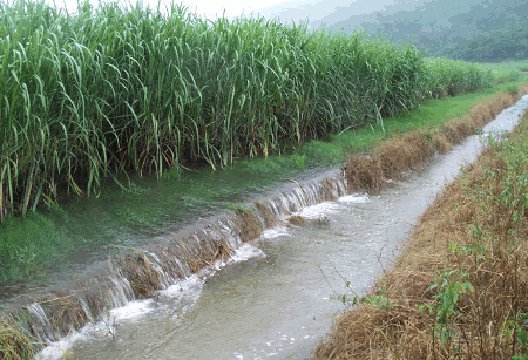All eyes on Great Barrier Reef run off
REEF HEALTH

MAJOR rainfalls in Far North Queensland turn major watercourses a bright shade of ochre as they pick up mud and silt on their way to the ocean. But this year, scientists and farmers are keeping a closer eye on the sediment-filled waters and their effects on the Great Barrier Reef.
Suspended sediment in floodwaters, sometimes with high levels of nitrogen, pesticides and other introduced elements can have serious effects on the health of coral and other marine life such as seagrass.
The Tropical Water Quality Hub of the Australian Government’s National Environmental Science Programme includes several projects focused on studying the interaction between floodwaters, agricultural catchments and the Great Barrier Reef.
Dr Aaron Davis from James Cook University heads up ‘Project 25’, a unique collaboration between scientists and cane farmers to monitor the content of river water along the course of the Russel- Mulgrave catchment south of Cairns.
Dr Davis says the big floods after a long dry season will give Project 25 its best insight yet into the content of the catchment’s runoff.
“These are interesting floods because they’re what’s referred to as ‘first flush’ events, so there’s a lot of stuff that’s accumulated or been applied throughout the catchment in the dry season that is being moved by this water all at once, so we’ll definitely be looking closely at these results, because they’ll give us the clearest picture of what’s in the water.
“What you’ll see in the runoff really depends on what kind of activity is occurring in that catchment – in a catchment with more bananas or grazing you’d typically expect to find more elevated suspended sediment, while in cane catchments you’ll probably that shift toward fertilizers nutrients and pesticides.
“The aim of the project is to provide more locally relevant water quality data to farmers in a region, which can assist decision-making and help guide practice change among the growers in these catchments to reduce potential runoff impacts.”
Cane farmer Stephen Calcagno is one of the biggest growers involved in Project 25 and said he was looking forward to seeing the results of the monitoring.
“We are always looking at ways of being able to reduce how much fertilizer and pesticides end up in the rivers because not only does that represent wasted spending for us, it’s also going out to the Great Barrier Reef and causing problems there.
“We want to keep the Reef in good nick as much as anyone else and we’re definitely keen to see how these measurements turn out so we can see what’s working in reducing that runoff.”
Dr Rebecca Bartley at CSIRO is running another Tropical Water Quality Hub project in the Burdekin region to test ways of reducing erosion in agricultural catchments.
“I previously ran a 12-year study on erosion in the Burdekin and the results were very interesting – it highlighted that if we want to see an improvement in the water quality leaving the catchments and reaching the Reef, we need to be treating the dominant erosion source. This may seem pretty obvious, but in the past, we actually didn’t know what the dominant sediment source was, so we tried a bit of everything. In the Burdekin, sediment tracing has now confirmed that gullies are a major source of sediment.”
“In our Tropical Water Quality Hub project we are trialling different gully remediation techniques. These include stock management with fencing, revegetation of gully banks with native vegetation and installing what we call ‘stick sausages’, which are bundles of sticks wrapped up with chicken wire designed to slow the water down and get sediment to settle out.”
“We have a number of paired sites where we will treat one gully, and leave the other gully in its current condition. We then measure the water quality leaving these sites. This will give us a much clearer idea of what type of remediation approaches work, and how much we can expect them to reduce erosion and improve water quality.”
“This research has actually never really been done before – everyone has had these assumptions about which techniques work, but until now we haven’t had any quantitative data. Once we know which techniques work, we hope that there will be much greater up-take of remediation across the catchment.”
Got something to say? Tell us what you think in the comments below!
* Readers are encouraged to use their full details below to ensure comment legitimacy. Comments are the opinions of readers and do not represent the views of Newsport or its staff. Comments containing unlawful, obscene, defamatory or abusive material will not be published.
________________________________________________________________
---------------------------------------------------

HAPPY VALENTINE'S DAY....HERE'S 7 ROMANTIC WAYS TO CELEBRATE IN PORT DOUGLAS
Who says romance is dead? Newport’s Rohan Walsh takes you through 7 Valentine’s Day options ahead of the day of lurve on Tuesday 14 February. You’d be a fool to miss out on these deals.
Roses are Red:
Woo your lover the traditional way with a romantic bouquet from Floral Edge. They’re offering FREE DELIVERY on all orders if you mention this article! ?Master the power of the flower!
?Diamonds are a Girl’s best friend:
Want to get your special someone that special something? ?Wicked Willie’s Jewellers will have a storewide sale for Valentine’s Day, with 15% off between the 10th -14th February! ?Not only that, there’ll be 25% off Freshwater Pearl necklaces, bracelets and Gemstone Bead Jewellery. Don’t be late or you might miss out on MORE than just a bargain!
Come Dine with me:
Treat yourselves to a delicious candlelit meal, surrounded by rainforest at the secluded Niramaya Restaurant. ?Niramaya Restaurant have a delicious 5 course menu planned for you. For only $80 per person, you can be the real Casanova this Valentine’s Day!
The Gift that keeps Giving:
Spoil your loved one with a Sexy Gift Pack from The Flower Lady. ?Each environmentally friendly box includes a bag of fresh rose petals, a beautiful Columbian rose, massage oil and a Sexualitea - a beautiful blend of herbal tea, guaranteed to stimulate the senses!? Perfect for a cosy, yet romantic night in with your lover.
Don’t go Bacon My Heart:
?We all know the way to a man’s heart is through his stomach, so why not grab a bite to eat from Dave’s Takeaway and stroll down to Four Mile Beach for a romantic afternoon watching the sun go down.
Call me QPid:
QPid is taking aim at QT Port Douglas Resort and has the perfect gift idea to nurture your lover. ?When you purchase a $300 spaQ gift voucher you’ll only pay $250! Use the promo code ‘callmeqpid’ online to buy yourself some free love!
The VIP Treatment:
Hire your very own Private Chef with Port Douglas Catering to treat you and your partner to a romantic Valentine’s Dinner in the comfort of your own home. *SOLD OUT!
